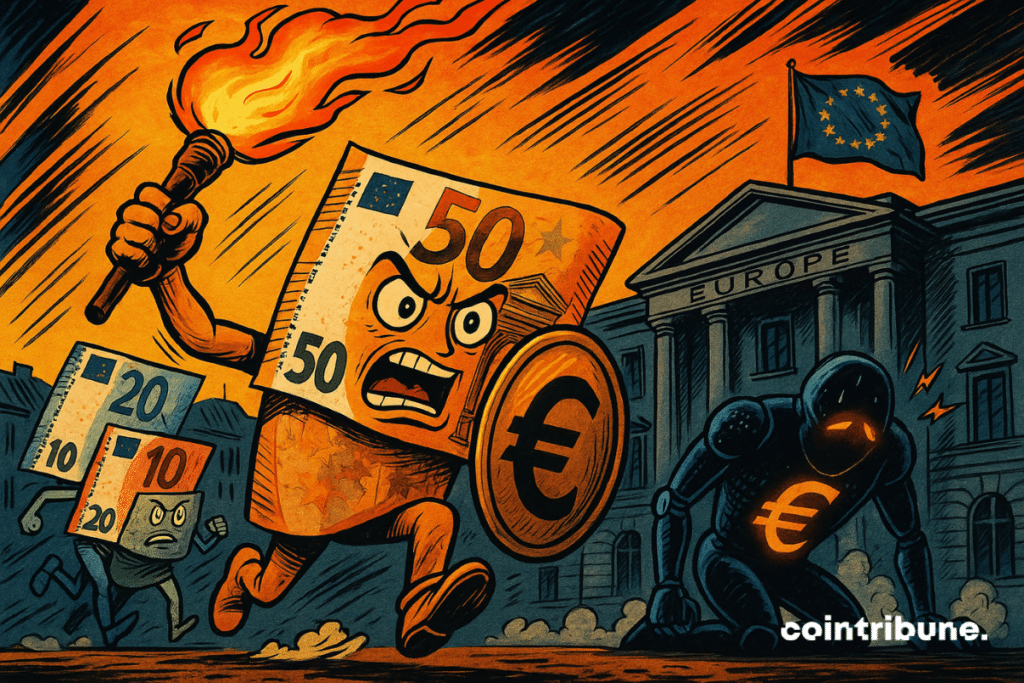ECB Doubles Down: Digital Euro Will Coexist With Cash (No Bank Run Needed)
Europe's central bank just threw cold water on cash Armageddon fears.
The digital euro won't kill physical money
ECB officials confirmed today that banknotes aren't going extinct—despite what crypto maximalists and doomsday preppers might claim. The proposed CBDC will operate alongside traditional currency, not replace it.
Why the reassurance matters
With adoption rumors swirling, the ECB had to clarify its position before citizens started stuffing mattresses with €500 bills (not that anyone still uses those). The move signals cautious progress—typical central bank speed—toward modernizing payments without destabilizing the system.
The fine print nobody reads
No mention of negative interest rates on digital holdings...yet. Because what's financial innovation without a way to quietly nudge behavior?
Another day, another baby step toward monetary futurism—with all the thrilling urgency of a Brussels bureaucracy meeting.

In Brief
- Cash remains the majority in 52% of in-store payments in 2024.
- Young people stock cash at home as a precaution since the pandemic.
- 62% of Europeans want to keep the option to pay in cash.
- The ECB promises coexistence between digital euro and traditional fiat currency.
Fractured Europe: when the reality of cash surpasses digital fiction
The dream of, like in Australia, persists among some policymakers. Yet, European reality disproves them. In 2024,. A statistic that unsettles proponents of fully digitized finance.
The payment map draws a clear divide:maintain between 69% and 73% of payments in cash, against only 28% in Sweden. Ireland, with 59%, also stands among the faithful bastions of banknotes and coins.
, a moderate decline of 5 points compared to 2023. This decline does not signal a break, but a slow erosion.
Young people, though highly connected, continue to keep cash for certain uses. Seniors, on the other hand, use it more for their everyday expenses.
This duality suggests a more complex reality:.
The standardization of payment methods seems to clash with rooted local logics, where cash remains a reassuring landmark, almost cultural.
When uncertainty strikes, cash regains ground
In a world where everything becomes digital,. In 2022, holding cash at home surged, especially among 18-37 year olds. This age group, considered ultra-digital, sees cash as a fallback solution.
The ECB’s SPACE report confirms this:than older generations to face the unexpected. The reason? Cash requires no network, no authorization, and remains usable in case of IT failure.

It is a. A weapon against banking exclusion. A tangible object in an increasingly volatile finance.
Cash is also seen as. During the pandemic, its perceived importance significantly increased across all age groups.
But public policies struggle to decide. Should innovation be accelerated, or monetary resilience supported? Between technological acceleration and perceived security, cash forces a rethink of our economic fundamentals.
A hybrid finance: preserving cash without hindering the digital euro
, say ECB officials. It will complement the existing offer. In their terms, it will be a “” – a dematerialized version of fiat currency.
Yet, 62% of Europeans still say it is important to be able to pay in cash. Even in the most digitally advanced countries, this option remains crucial.
, often cited as a, had to revise its approach. Its government now recommends keeping at least seven days of cash expenses at home.
Europe does not want to repeat this excess. Its 2030 fiat strategy relies on. The goal is to preserve universal access to cash while preparing future digital uses.
Cash and finance in 5 key figures:
- 52% of in-store payments made in cash in 2024;
- 69% to 73% cash in Germany, Austria, Switzerland;
- Only 28% in Sweden;
- 58% of Europeans worried about digital payment privacy;
- 62% want to keep the choice of cash.
This hybrid model reflects a democratic principle: finance must guarantee everyone the payment method that suits them.
If cash use declines in the long term, some analysts think Bitcoin could emerge the winner. Unlike central bank digital currencies, bitcoin promises control without intermediaries, built-in scarcity, and resistance to monetary policies. A future without cash could therefore reshuffle the cards… to the benefit of the decentralized king.
Maximize your Cointribune experience with our "Read to Earn" program! For every article you read, earn points and access exclusive rewards. Sign up now and start earning benefits.

